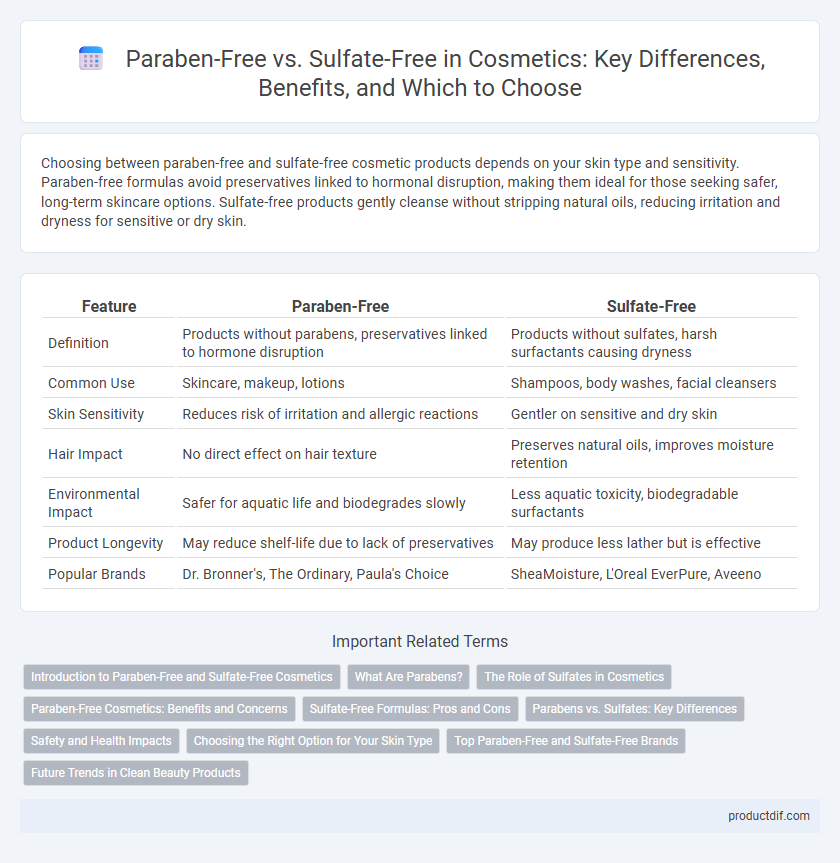Choosing between paraben-free and sulfate-free cosmetic products depends on your skin type and sensitivity. Paraben-free formulas avoid preservatives linked to hormonal disruption, making them ideal for those seeking safer, long-term skincare options. Sulfate-free products gently cleanse without stripping natural oils, reducing irritation and dryness for sensitive or dry skin.
Table of Comparison
| Feature | Paraben-Free | Sulfate-Free |
|---|---|---|
| Definition | Products without parabens, preservatives linked to hormone disruption | Products without sulfates, harsh surfactants causing dryness |
| Common Use | Skincare, makeup, lotions | Shampoos, body washes, facial cleansers |
| Skin Sensitivity | Reduces risk of irritation and allergic reactions | Gentler on sensitive and dry skin |
| Hair Impact | No direct effect on hair texture | Preserves natural oils, improves moisture retention |
| Environmental Impact | Safer for aquatic life and biodegrades slowly | Less aquatic toxicity, biodegradable surfactants |
| Product Longevity | May reduce shelf-life due to lack of preservatives | May produce less lather but is effective |
| Popular Brands | Dr. Bronner's, The Ordinary, Paula's Choice | SheaMoisture, L'Oreal EverPure, Aveeno |
Introduction to Paraben-Free and Sulfate-Free Cosmetics
Paraben-free cosmetics eliminate synthetic preservatives linked to hormone disruption, appealing to consumers seeking safer skincare options. Sulfate-free products avoid harsh cleansing agents like sodium lauryl sulfate, reducing irritation and dryness, especially for sensitive skin types. Both formulations prioritize gentle, health-conscious ingredients while maintaining effective cleansing and preservation in cosmetic products.
What Are Parabens?
Parabens are a group of synthetic compounds commonly used as preservatives in cosmetic products to prevent the growth of harmful bacteria and mold. These chemicals, including methylparaben, propylparaben, and butylparaben, have raised health concerns due to their potential hormone-disrupting effects and links to allergic reactions. Choosing paraben-free cosmetics helps reduce exposure to these controversial preservatives while maintaining product safety and shelf-life.
The Role of Sulfates in Cosmetics
Sulfates in cosmetics act as powerful cleansing agents that create rich lathers, effectively removing dirt, oil, and makeup from the skin and hair. Common sulfates like sodium lauryl sulfate (SLS) and sodium laureth sulfate (SLES) can sometimes cause irritation or dryness, particularly in sensitive skin types. Paraben-free products focus on avoiding preservatives linked to hormone disruption, while sulfate-free formulations prioritize gentler cleansing to maintain natural moisture and reduce potential irritation.
Paraben-Free Cosmetics: Benefits and Concerns
Paraben-free cosmetics reduce exposure to synthetic preservatives linked to hormone disruption and allergic reactions, promoting safer skincare for sensitive skin types. These products often appeal to health-conscious consumers seeking natural ingredients without compromising on product efficacy. However, the absence of parabens can raise concerns about shorter shelf life and potential microbial contamination, necessitating alternative preservation methods.
Sulfate-Free Formulas: Pros and Cons
Sulfate-free formulas are highly favored in cosmetic products for their gentle cleansing properties that reduce skin irritation and preserve natural oils, making them ideal for sensitive or dry skin types. These formulas often incorporate mild surfactants like cocamidopropyl betaine, which effectively remove impurities without stripping moisture or causing scalp dryness. However, sulfate-free products can sometimes produce less lather and may not clean as deeply as sulfate-containing counterparts, potentially requiring longer or more frequent use for thorough cleansing.
Parabens vs. Sulfates: Key Differences
Parabens are preservatives commonly used in cosmetics to prevent bacterial growth, while sulfates are cleansing agents that create lather and remove oils. Paraben-free products reduce exposure to potential endocrine disruptors linked to hormone imbalances, whereas sulfate-free formulas minimize skin irritation and dryness caused by harsh surfactants like sodium lauryl sulfate. Choosing between paraben-free and sulfate-free depends on individual skin sensitivity and concerns related to preservation versus cleansing agents in skincare and haircare products.
Safety and Health Impacts
Paraben-free cosmetics reduce the risk of hormone disruption and allergic reactions caused by parabens, making them a safer option for sensitive skin and long-term health. Sulfate-free products prevent scalp irritation and dryness by avoiding harsh cleansing agents like sodium lauryl sulfate, promoting healthier hair and skin. Choosing paraben-free and sulfate-free cosmetics supports overall safety by minimizing exposure to potentially harmful chemicals.
Choosing the Right Option for Your Skin Type
Paraben-free products are ideal for sensitive or allergy-prone skin as they minimize the risk of irritation caused by preservatives. Sulfate-free formulations work best for dry or damaged skin, preventing excessive stripping of natural oils and maintaining moisture balance. Selecting between paraben-free and sulfate-free cosmetics depends on your skin's tolerance to preservatives versus detergents, ensuring optimal skin health and comfort.
Top Paraben-Free and Sulfate-Free Brands
Top paraben-free brands like Drunk Elephant, Paula's Choice, and Tata Harper prioritize natural ingredients to reduce skin irritation and hormone disruption risks. Leading sulfate-free brands such as Briogeo, SheaMoisture, and Living Proof focus on gentle cleansing agents that protect hair moisture and prevent scalp dryness. Choosing products from these trusted brands ensures effective skincare and haircare without harmful chemicals.
Future Trends in Clean Beauty Products
Paraben-free and sulfate-free formulations are driving innovation in the clean beauty industry, aligning with consumer demands for safer, non-toxic ingredients. Emerging technologies emphasize sustainable sourcing and biodegradable components to enhance product efficacy without harmful chemicals. These trends indicate a growing market shift towards transparency, cruelty-free practices, and eco-conscious packaging in cosmetic products.
paraben-free vs sulfate-free Infographic

 productdif.com
productdif.com